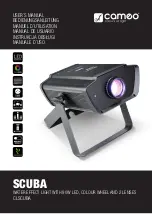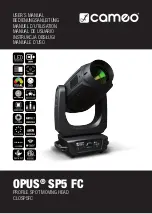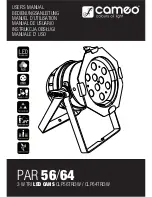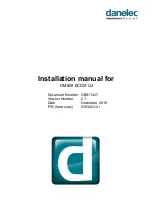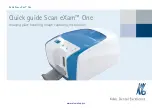
1942409
V1.1
3 June 2021
Installation:
This CBS4N Surface mount non-maintained Emergency Luminaire can be installed on solid surface or
used to replace an existing unit.
•
Locate the installation position.
•
Refer Images and Dimensions below for the Cut-out Hole and other dimensions.
•
Pre-drill mounting holes.
•
Mount base plate and use suitable fixings to secure the base plate into the pilot holes
•
Bring in supply cables via the rear entry hole or via the end of the base plate (surface mount
conduit entry)
•
Terminate the supply cables to the L, N & E terminals (in the case of the
–DALI or –DATA fittings
terminate the DALI or DATA cable to the terminals marked Da Da or DATA).
•
Install the top cover, containing the LifeLight Pro heads, ensuring to reconnect the Heads assembly
to the Control Gear.
•
Ensure the Battery is connected
•
Screw the cover to the base plate.
•
If the CTP capabilities are activated, please affix the CTP Status Label to a visible
surface and
Four Segment Marking on the p
roduct will include an ‘’F’’ in third segment block.
Networking:
When installing the product on a monitored network, (ZONEWORKS, DATA, HIVE, DALI) simply insert
the relevant Smart Node PCA.
Images and Dimensions:
Initial Testing:
When the CBS4N unit is connected to the un-switched active, it must be allowed to charge the battery
for at least 24 hours. The emergency lamp only illuminates during a power failure. Conduct the following
tests:
•
During the first commissioning test the emergency lamp must illuminate for at least 2 hours after
disconnection from the main supply. The results of all tests are required to be recorded in a service
logbook, which is to be kept on-site at all times. If the unit fails to illuminate for the requisite time,
remedial action must be taken to repair the situation and once completed, the unit must pass a
subsequent test.
•
Press and hold Test Button for each LED head or switch Off Mains Supply, check that the
emergency lamps are On.
•
Release the Test Button or Switch on Mains Supply, check that the emergency lamp is Off (Non-
maintained operation).
Below are a list of common problems and their possible causes:
Fault:
The Green LED indicator is not illuminated.
Check: A.C. is connected and is turned on.
Battery is connected.
Test Switch for damage.
Fault:
Lamp does not illuminate in emergency mode.
Check: A.C. is connected.
Lamp is correctly inserted.
Battery is connected
Fault:
Lamp illuminates in emergency mode, but only stays on for a short period.
Check:
Battery has been allowed to charge for at least 24 hours.
Battery for damage.
Rated Emergency Lumen Output in accordance with AS2293.1 (refer
to spacing tables for installation positions):
Refer to the Technical Label on the Product for classification information.
Caution:
On many building sites, power circuits may be cut off in an uncontrolled and repetitive basis during
construction. As a result, any fittings Units, on these circuits, will have their batteries discharged or
“cycled”. The Li-ion battery in the Fitting has been selected to give excellent long-life performance in a
controlled IEC 60598-2-22 testing environment. Excessive battery cycling will reduce through-life
performance and may lead to premature battery failure. Battery warranty claims, as a result of such
abuse, are specifically EXCLUDED from Clevertronics warranty terms.
Warranty:
For Product Warranty information and Terms and Conditions of Sales please refer to our website
http://clevertronics.com.au/terms-conditions-sale-australia-nz/
Cable entry points
End view
Chain suspension points
Surface suspension points




